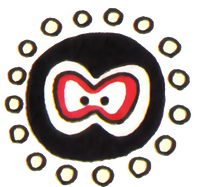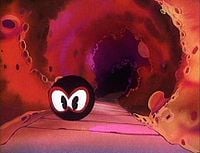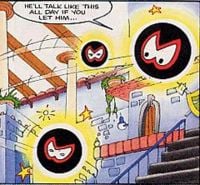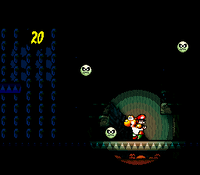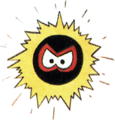Spark
- This article is about the enemies debuting in Donkey Kong Jr. For other uses of the word Spark, see Spark (disambiguation).
| Spark | |||
|---|---|---|---|
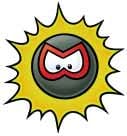 Artwork from Super Mario Advance | |||
| First appearance | Donkey Kong Jr. (1982) | ||
| Latest appearance | Nintendo World Championships: NES Edition (2024) | ||
| |||
| |||
Sparks are orb-shaped creatures that emit pulses and flashes of electricity continually. They are mostly found crawling around walls and ceilings and moving across wires. Sparks are the first in a series of enemies in the Super Mario franchise that are balls of electricity, including Lil Sparkies and Amps.
History
Donkey Kong series
Donkey Kong Jr.
Sparks first appear in Mario's Hideout of Donkey Kong Jr. Red Sparks (also known as Globes[1]) continue to circle their own platform, but blue ones can travel to other platforms through static particles. These Sparks are generated by Mario in order to shock Donkey Kong Jr., preventing him from saving his father. Blue Sparks do not appear in the Coleco Adam port, which alters the stage layout and replaces them with hazardous green water drops instead.
Donkey Kong (Game Boy)
In the Game Boy version of Donkey Kong, only one Spark[2] appears in Stage 6-4, rotating clockwise at a medium pace around a small platform in the path of a Conveyor Belt. It has the same behavior as the Sniper and Sukōpī seen earlier in the game, except losing a life from the Spark displays an electrocution animation. Unlike other appearances, the Spark in this game lacks eyes. This game also introduces a more common wire-crossing successor.
Yume Kōjō: Doki Doki Panic / Super Mario Bros. 2
Sparks appear in Yume Kōjō: Doki Doki Panic and Super Mario Bros. 2, usually underground or in buildings. Sparks circle platforms, though some can hover in the air if a Mushroom Block is pulled out from beneath them. Sparks cannot be jumped on and damage the player character when touched. A Spark is defeated if either hit by an object or from a POW Block being used nearby. A Spark is defeated automatically if the screen scrolls while they are in a specific position.[3] In original versions, Sparks have red outlines around their eyes; in the Super Mario All-Stars version and other subsequent remakes, they have yellow outlines as well as an orange outer body outline. In the remake, touching a Spark knocks the player back as the screen flashes, and an item named the Spark Chaser can expel them from jar interiors.
The Super Mario Bros. Super Show!
- “Spark on the warpath!”
- —Mario, "On Her Majesty's Sewer Service"
A Spark appears only in the episode "On Her Majesty's Sewer Service" in The Super Mario Bros. Super Show!. It does not discharge any electricity. The Spark is encountered by Mario and Luigi in the Tunnel of Doom as they run from a Goomba. Both are avoided when Mario and Luigi create a grappling hook out of a super spy hose nozzle and mini plunger; apparently unable to stop moving, the Spark and Goomba subsequently crash into one another, causing an explosion.
Nintendo Comics System
Sparks appear prominently in issues of Nintendo Comics System, appearing in such stories as "The Legend," "Bedtime for Drain-Head," and "A Mouser in the Houser." Like most enemies featured in the stories, they are shown to be intelligent and fully capable of speech.
Yoshi's Island series
Super Mario World 2: Yoshi's Island / Yoshi's Island: Super Mario Advance 3
Sparks are referred to as Piro Dangles[4] in Super Mario World 2: Yoshi's Island and its remake. They emit fire instead of electricity and have faces similar to that of Fryguy. Occasionally, their fire temporarily goes out, revealing that underneath they are white spheres. During this time, they are harmless. Piro Dangles can be found only in a secret room in Burt The Bashful's Fort, as well as in Endless World of Yoshis in the remake, where they can also be defeated from a blue watermelon. There is also an unused variant of Boo Blah that has a Piro Dangle on its head.
Yoshi's New Island
In Yoshi's New Island, Sparks occur only within dark rooms in Beware the Boo Brigade and Fort Key Calamity.
The Legend of Zelda series
- Zelda Wiki article: Spark
Sparks appear with the same wall-running behavior in multiple games in The Legend of Zelda series. In The Legend of Zelda: A Link to the Past, Sparks flash between orange and blue and are completely invincible, appearing in a few dungeons. In this game, they also share the same graphics as the segmented fire bars and Fire Snakes, which stay orange. Sparks more commonly in The Legend of Zelda: Link's Awakening, The Legend of Zelda: Oracle of Seasons/Ages, and The Legend of Zelda: The Minish Cap, and can be destroyed with the boomerang, which turns them into fairies.
Profiles and statistics
Super Mario series
Super Mario Bros. 2
- Instruction booklet description:
- English:
He shines and moves in a circular motion around the walls and floors of the underground. He moves fast or slow.[5]
- English:
- Game Boy Advance
- Instruction booklet description:
- English (British):
You'll find Sparks circling blocks and steps. It's best to use POW blocks to turn off their power.[6]
- English (British):
Perfect Ban Mario Character Daijiten
Donkey Kong series
Super Mario USA
Yoshi's Island series
Super Mario World 2: Yoshi's Island / Yoshi's Island: Super Mario Advance 3
- Shogakukan guide: 暗闇の中で、壁に沿って動いている。火が消えて白くなったときをねらって、通り抜けよう。[7] (They move along walls in the dark. Try to get by when their flames are extinguished and they turn white.)
- Player's Guide: Mr. P.D. jealously guards a secret cache of coins in Burt the Bashful's Fort.[4]
- Shogakukan guide (Game Boy Advance version): 暗やみの中で、かべに沿って動いている。火が消えて白くなったスキに、通りぬけよう。[8] (They move along walls in the dark. Get by when their flames are extinguished and they turn white.)
Yoshi's New Island
- Shogakukan guide: 一定の間隔で光を放ち、ゆっくりと移動すろ。光を照明がわりにして暗い部屋を進もう。光ったときだけ、触れるとダメージを受ける。倒すことはできない。[9] (Emits light at regular intervals and moves slowly. Use the light as a light source to advance through the dark room. If you touch it, you will take damage only when it glows. It cannot be defeated.)
Gallery
- For this subject's image gallery, see Gallery:Spark.
Donkey Kong Jr. (arcade, red)
Names in other languages
Spark
| Language | Name | Meaning | Notes |
|---|---|---|---|
| Japanese | スパーク[10][7][9][8][11] Supāku |
Spark | Donkey Kong series, Yoshi's Island series, and The Legend of Zelda series |
| スパック[10][12] Supakku |
A corruption of "Spark" | Super Mario Bros. 2 | |
| Chinese | 火花[21] Huǒhuā |
Spark | |
| Chinese (simplified) | 电球[11] Diànqiú |
Electric ball | The Legend of Zelda series |
| Chinese (traditional) | 電球[11] Diànqiú |
Electric ball | The Legend of Zelda series |
| Dutch | Spark[11] | - | The Legend of Zelda series |
| French (NOA) | Spark[11] | - | The Legend of Zelda series |
| French (NOE) | Eclair[13] | From éclair ("sparkle") | |
| German | Funke[13] | Spark | |
| Pyro Head[?] | - | ||
| Spark[11] | |||
| Italian | Scintilla[13][14][15] | Spark | Donkey Kong Jr., The Legend of Zelda Encyclopedia |
| Scarica elettrica[16] | Electrical charge | Donkey Kong II | |
| Spark[17][18][11] | - | Super Mario Bros. 2, The Legend of Zelda: Minish Cap, The Legend of Zelda: Link's Awakening (Nintendo Switch) | |
| Favilla[19] | Spark | Super Mario Advance | |
| Sfavillotto[20] | Li'l Spark; shared with Luma | Super Mario Bros. Encyclopedia | |
| Korean | 스파크[11] Seupakeu |
Spark | The Legend of Zelda series |
| Russian | Искрик[11] Iskrik |
Sparks | The Legend of Zelda series |
| Spanish (NOA) | Chispa[11] | Spark | The Legend of Zelda series |
| Spanish (NOE) | Chispa[13] | Spark | |
| Spark[11] | - | The Legend of Zelda series |
Globe
| Language | Name | Meaning | Notes |
|---|---|---|---|
| Japanese | スパーク[10] Supāku |
Spark | |
| French | Boulet[13] | Ball | |
| German | Feuerkugel[13] | Fireball | |
| Italian | Globo[13] | Globe | |
| Spanish | Globo[13] | Globe |
References
- ^ Instruction manual for Atari 8-bit and Atari 7800 conversions[page number needed]
- ^ August 20, 1994. 「任天堂公式ガイドブック ドンキーコング」 (Nintendo Kōshiki Guidebook – Donkey Kong). Shogakukan (Japanese). ISBN 4-09-102485-8. Page 59.
- ^ Video. Small Mario Findings (English). Retrieved July 4, 2024.
- ^ a b Miller, Kent, and Terry Munson (1995). Super Mario World 2: Yoshi's Island Player's Guide. Nintendo of America (American English). Page 128.
- ^ 1988. Super Mario Bros. 2 Instruction Booklet (PDF). Nintendo of America (American English).[page number needed]
- ^ 2001. Super Mario Advance European instruction booklet (PDF). Nintendo of Europe (British English). Page 11.
- ^ a b September 20, 1995. 「スーパーマリオヨッシーアイランド任天堂公式ガイドブック」 (Super Mario: Yossy Island Nintendo Kōshiki Guidebook). Shogakukan (Japanese). ISBN 4-09-102523-4. Page 5.
- ^ a b November 20, 2002. 「スーパーマリオアドバンス3任天堂公式ガイドブック」 (Super Mario Advance 3 Nintendo Kōshiki Guidebook). Shogakukan (Japanese). ISBN 4-09-106701-4. Page 17.
- ^ a b August 9, 2014. 「ヨッシー New アイランド 任天堂公式ガイドブック」 (Yoshi's New Island Nintendo Kōshiki Guidebook). Shogakukan (Japanese). ISBN 978-4-09-106542-1. Page 20.
- ^ a b c November 20, 1994. Perfect Ban Mario Character Daijiten. Shogakukan (Japanese). ISBN 4-09-259067-9. Page 96.
- ^ a b c d e f g h i j k The Legend of Zelda: Link's Awakening (Nintendo Switch) enemy glossary
- ^ 1994. Perfect Ban Mario Character Daijiten. Shogakukan (Japanese). Page 225.
- ^ a b c d e f g h Donkey Kong Junior Atari computer version manual (International)[page number needed]
- ^ Donkey Kong Jr. (3DS - Virtual Console) Italian e-manual. Page 8.
- ^ The Legend of Zelda: Enciclopedia di Hyrule. Page 205.
- ^ Donkey Kong II Italian manual
- ^ Super Mario Bros. 2 Italian manual. Page 26.
- ^ The Legend of Zelda: Minish Cap figurine gallery: "080 - Spark"
- ^ 2001. Super Mario Advance manual. Nintendo of Europe (Italian). Page 111.
- ^ November 15, 2018. Super Mario Bros. Enciclopedia. Magazzini Salani (Italian). ISBN 889367436X. Page 67.
- ^ From the ending scenes of Super Mario Advance as localized by iQue. Reference: 无敌阿尔宙斯 (August 28, 2013). 神游 超级马力欧2敌人官译. Baidu Tieba (Simplified Chinese). Archived February 26, 2017, 16:11:09 UTC from the original via Wayback Machine. Retrieved July 4, 2024.
External links
| Donkey Kong Jr. | ||
|---|---|---|
| Characters | Donkey Kong Jr. • Donkey Kong • Mario | |
| Enemies | Bird • Drop* • Egg • Nitpicker • Snapjaw • Spark | |
| Items | Fruit • Key | |
| Objects | Chain • Jump Board • Pole | |
| Rounds | Vine Scene • Jump Board Scene • Mario's Hideout • Chain Scene | |
| Other | Gallery • Media • Pre-release and unused content • Staff | |
| Donkey Kong | |
|---|---|
| Characters | Donkey Kong • Mario • Pauline |
| Levels | 25m • 50m • 75m • 100m |
| Items and objects | Bolt • Conveyor Belt • Hammer • Ladder • Lift • Parasol, Hat & Bag |
| Enemies and obstacles | Barrel • Cement tub • Fire • Fireball • Jack • Oil drum |
| Other | 25m Theme • Gallery • Media • Opening • Staff |
